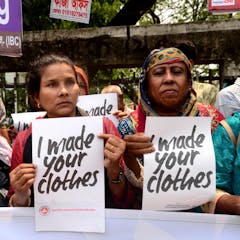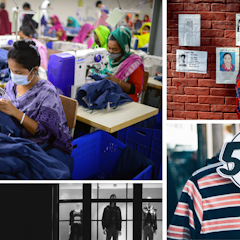
Articles on Fast fashion
Displaying 1 - 20 of 53 articles

Ballooning inventories are to blame for much of the fashion’s sector carbon footprint. Could on-demand production solve such problems?

West African designers produce only the clothes that are needed, preventing waste and allowing space for creativity.

Growing mountains of textile waste are hard to recycle. There is scope to improve chemical and mechanical recycling methods but consumers and fashion brands play a role in reducing overproduction.

We know fast fashion is bad for the environment. Ultra-fast fashion makes matters worse. This disturbing trend towards disposable clothing is the opposite of sustainable. Here’s what must be done.

Every wardrobe tells a story and reconnecting with the clothes you already own could reduce your need to buy more fast fashion. Here are three ways to fall back in love with your wardrobe.

Secondhand markets are built to increase consumption, not cut it back.

Keeping up with the Kardashians can be a real pain. How fashion trends from waist trainers to celebrity endorsed sneakers could do more harm than good.

It’s often challenging to live up to your new year’s resolutions – but becoming greener is surprisingly easy.

Brands like Zara and H&M are teaming up with recycled textile producers but more collaboration is needed.

Product-labelling tools have been criticised for making partial assessments of a brand’s impact.

If you’re going to a wedding this summer, you should consider renting your outfit.

Ten years after a garment factory collapsed in Bangladesh, scholars find slow fashion practices hold the keys to a more sustainable, joyful relationship with clothes.

The collapse of Rana Plaza on March 24, 2013, put the focus on fast fashion. But research shows that stressed and struggling consumers don’t have the luxury of making ethical choices.

Ten years after the collapse at Rana Plaza in Bangladesh, the garment industry’s deadliest disaster, reforms are incomplete. The opaqueness of today’s complex supply chain is part of the problem.

At least 1,132 workers died when the Rana building collapsed in Bangladesh, while several thousand more were injured.

We look back to the 2013 Rana Plaza garment factory collapse in Bangladesh that killed 1,124 people and discuss how much — or how little — has changed for garment-worker conditions today.

Producer responsibility is increasingly being used to deal with the environmental costs of production. It can also be used to deal with social issues.

The fashion industry is responsible for around 5% of global greenhouse gas emissions. It’s high time global fashion brands invest in greener alternatives.

By offering a limited click and collect service, the retailer can gauge the benefits versus the costs and hassle of managing product returns.

Fashion has a notorious environmental footprint, and long-standing fast fashion marketing practices are exaggerating this further.
